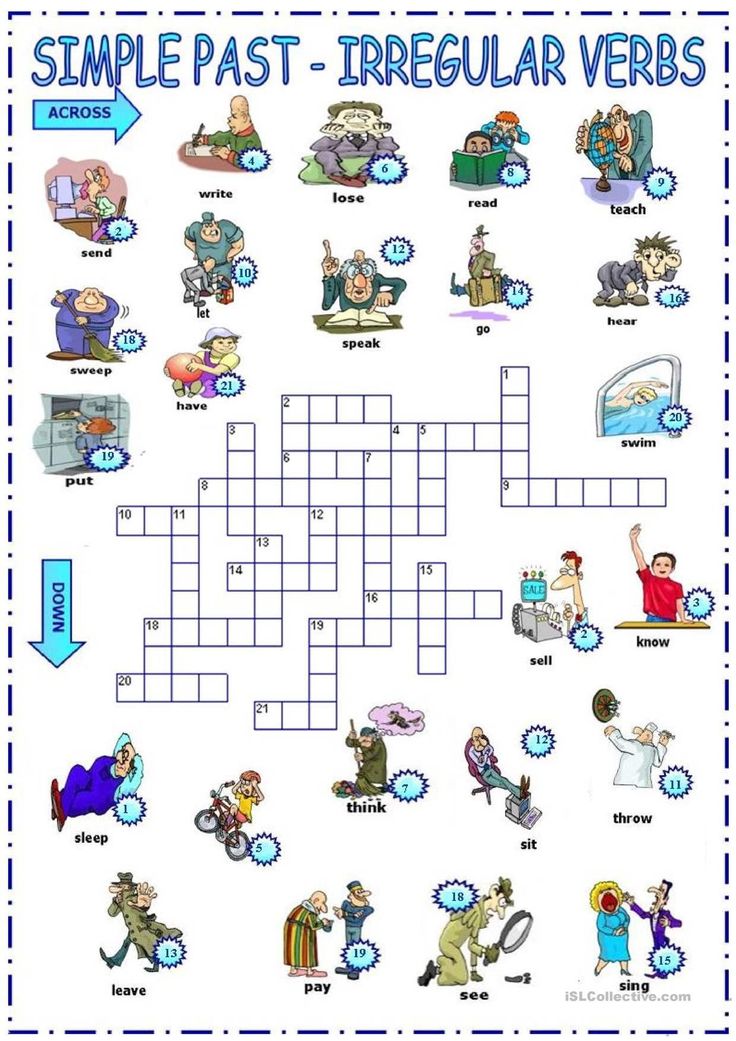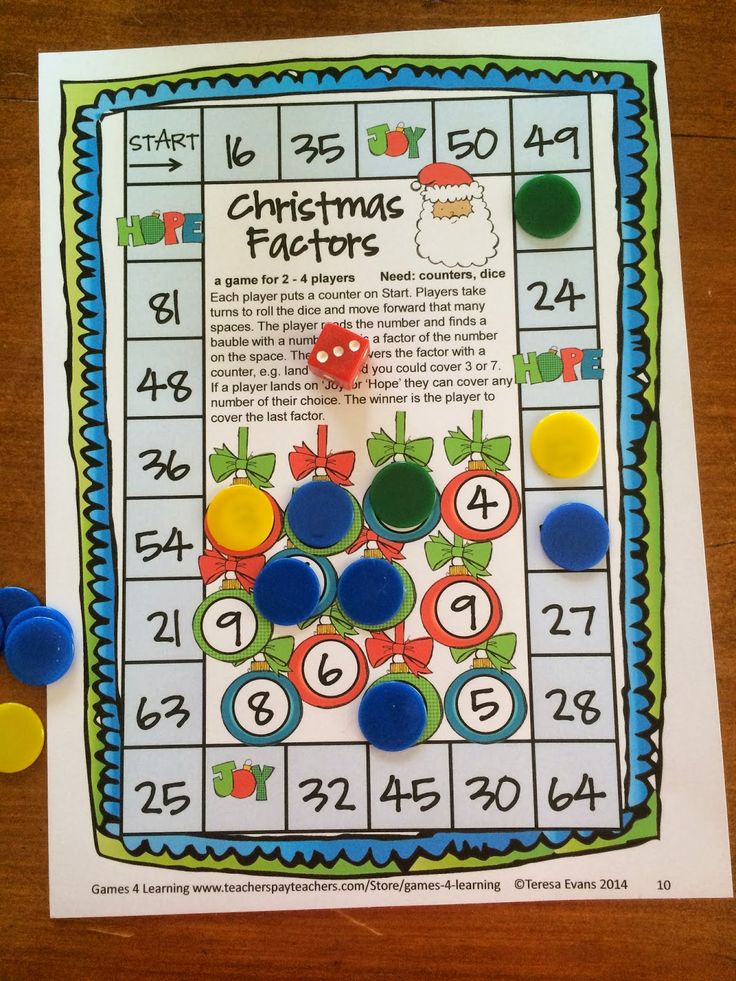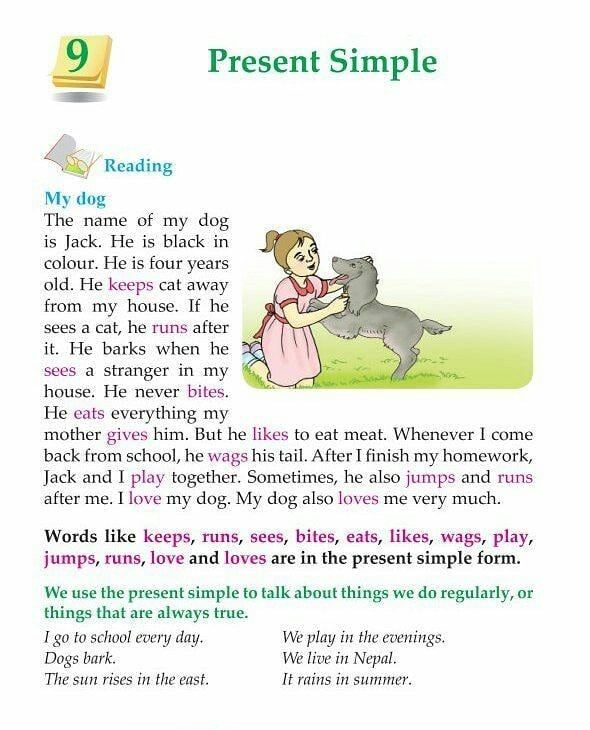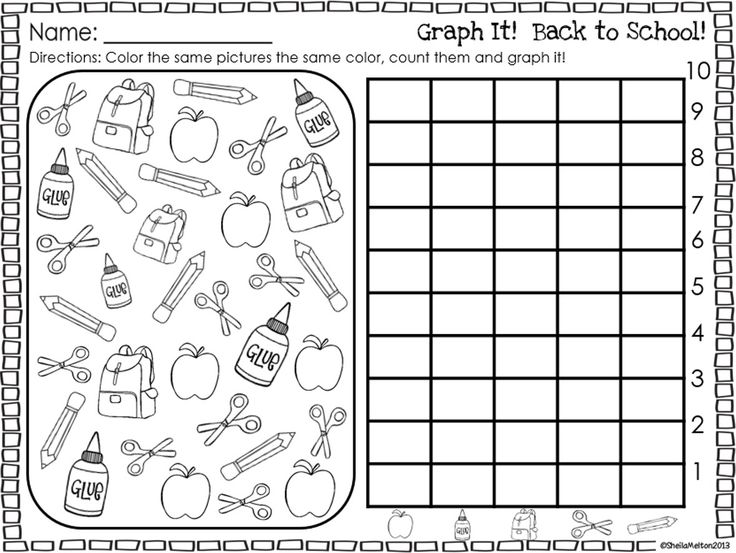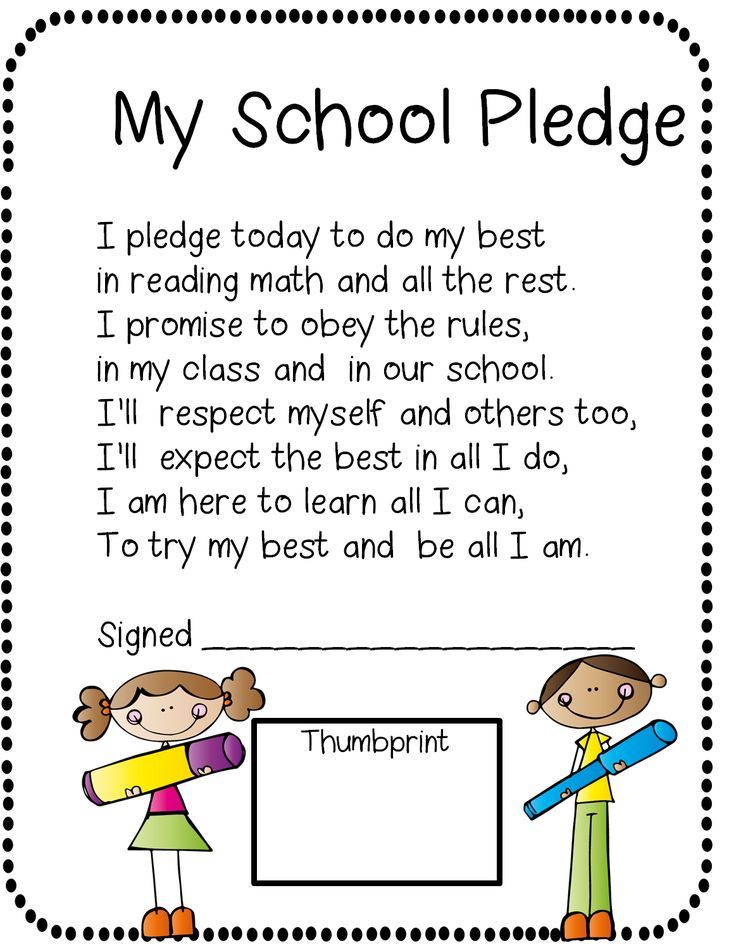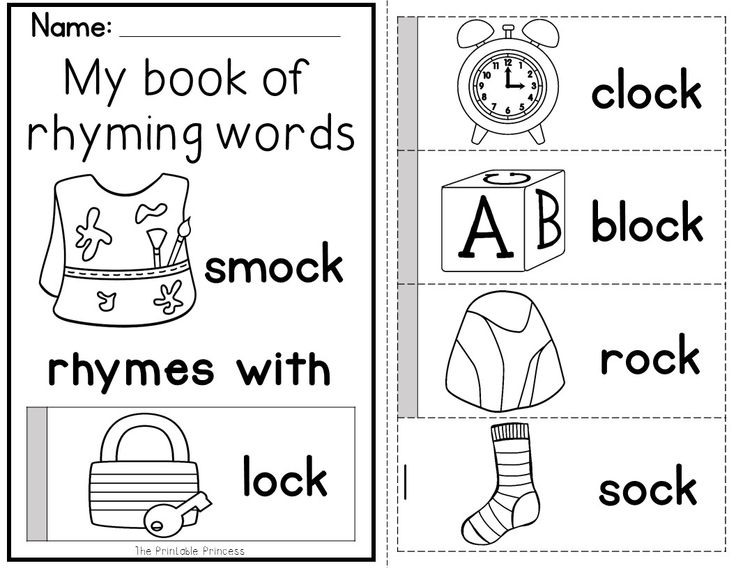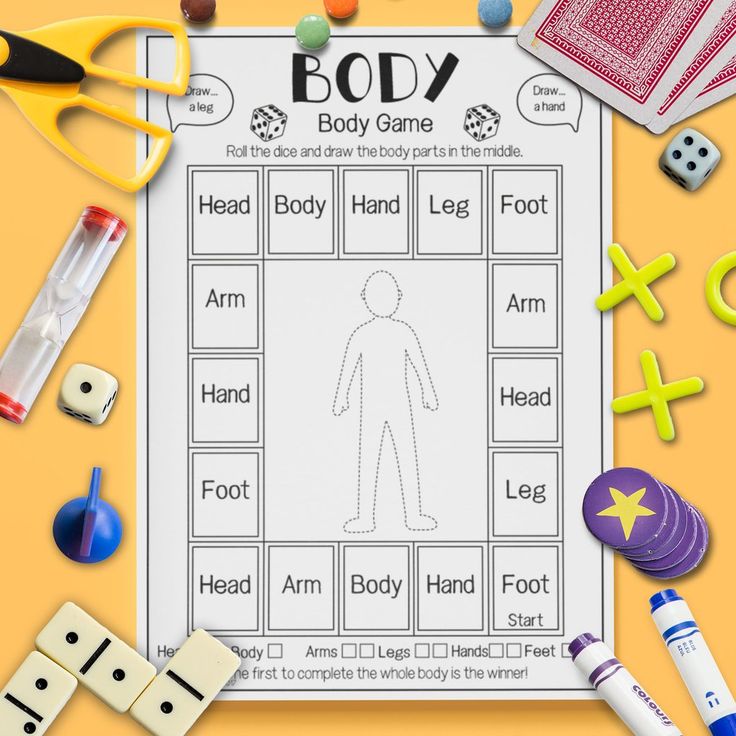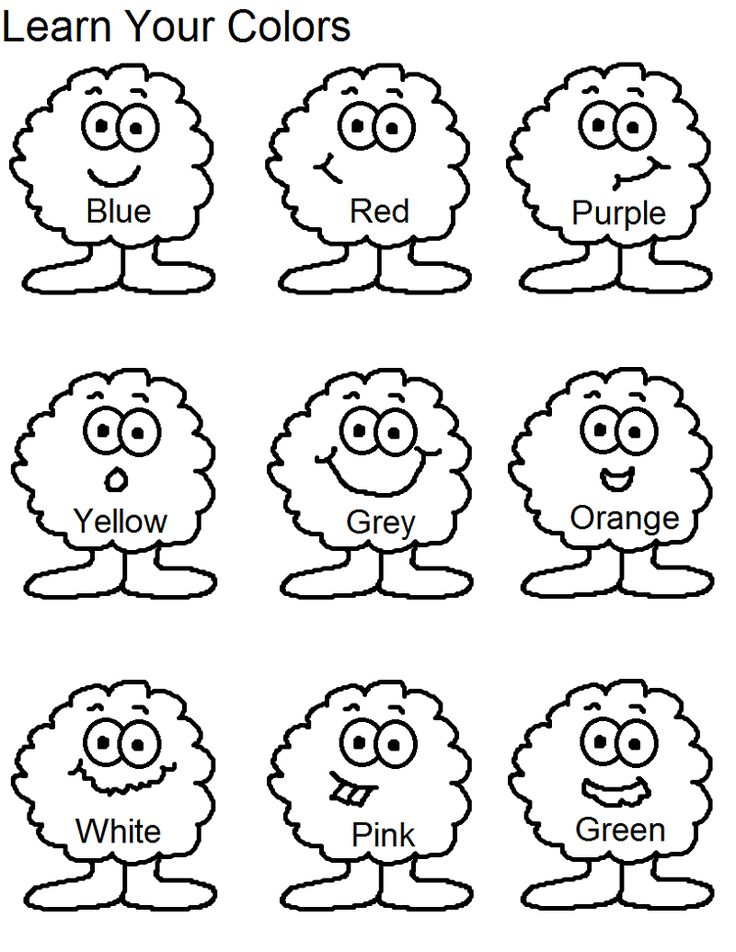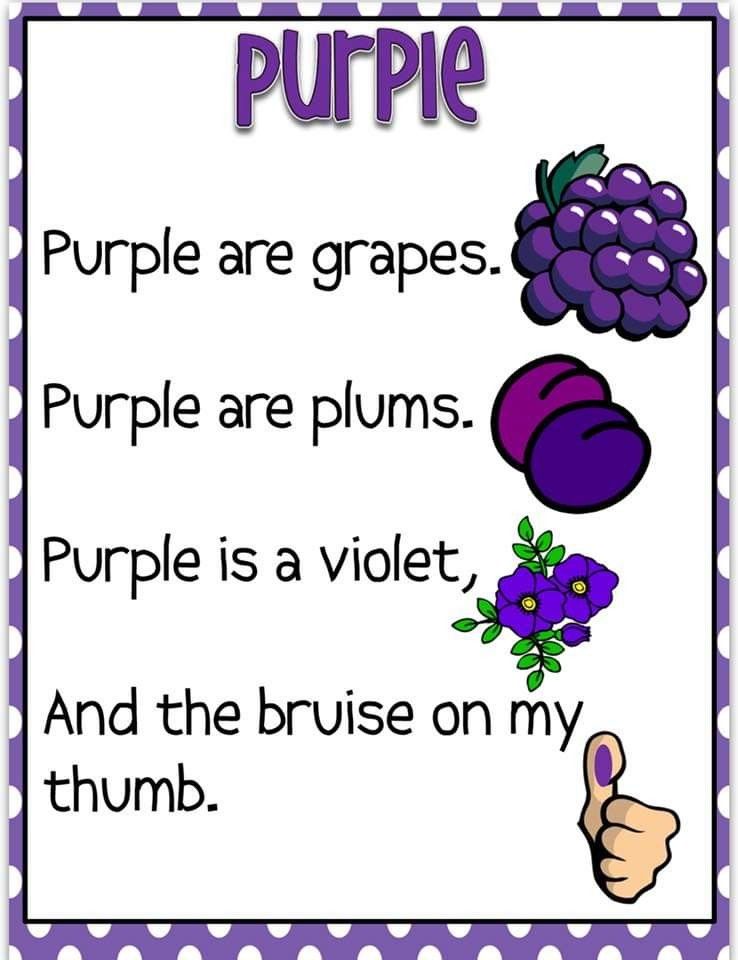Irregular verbs for kids
Regular and Irregular Verb Examples | What is an Irregular Verb?
Regular and Irregular Verb Examples: What is an Irregular Verb?
Verbs in English can be regular or irregular. Regular verbs form their past and past participle forms by adding –ed (jumped - played - watched). Irregular verbs do not follow this pattern. There are 3 types of irregular verbs. These are: Verbs in which all the three forms are the same (cut – cut – cut). Verbs in which two of the three forms are the same (keep – kept – kept). Verbs in which all three forms are different (drive – drove – driven). In these examples the regular and irregular verbs are in bold. Check out our regular and irregular verbs infographic below.
Regular and Irregular Verbs Sentence Examples
Regular verbs follow simple past and past participle forms. Conversely, irregular verbs have their own set of rules, to create past tense forms. Check out the sentences below and our free regular and irregular verbs poster.
- Regular verb sentences:
- I watched TV last night.
- I played baseball this morning.
- We studied hard for this test.
- I enjoyed the new film.
- My brother climbed the cliff wall.
- The lamb jumped over the fence.
- They cooked an amazing meal.
- Irregular verb sentences:
- We ate the pizza quickly.
- I drank some cola.
- They slept in the treehouse.
- She got a watch for my birthday.
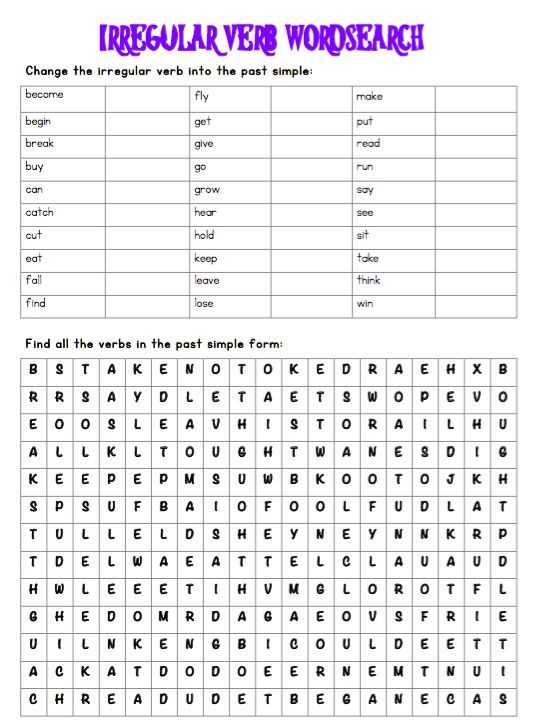
- He swam in the ocean.
- The child dug a hole at the beach.
- The dog hid the bone in the garden.
Regular and Irregular Verbs Games and Worksheets
Looking for more resources related to regular and irregular verbs? Check out our comprehensive list of worksheets and video games. Download worksheets and play interactive games for free.
- Regular and irregular verb worksheets
- More grammar games>>>
- More vocabulary games>>>
Grammar Rules
- Abstract nouns
- Active voice
- Adjectives
- Adverbs
- Adverbials
- Affirmatives
- Articles
- Attributive adjectives
- Auxiliary verbs
- Classifying adjectives
- Clauses
- Collective nouns
- Common nouns
- Comparatives
- Compound nouns
- Conditionals
- Conjunctions
- Connectives
- Consonants
- Contractions
- Countable nouns
- Defining relative clauses
- Determiners
- Direct speech
- Finite verbs
- Future continuous
- Future simple
- Future perfect
- Future perfect continuous
- Gerunds
- Homophones
- Imperatives
- Indefinite articles
- Indirect speech
- Infinitives
- Interrogatives
- Intransitive verbs
- Irregular verbs
- Main clauses
Grammar Rules
- Modal verbs
- Modifiers
- Non-finite verbs
- Nouns
- Objects
- Participles
- Passive tense
- Past continuous
- Past simple
- Past perfect
- Past perfect continuous
- Personal pronouns
- Phrasal verbs
- Phrases
- Plurals
- Possessive pronouns
- Prefixes
- Prepositions
- Present continuous
- Present perfect
- Present perfect continuous
- Present simple
- Pronouns
- Proper nouns
- Proverbs
- Quanitifiers
- Regular verbs
- Relative clauses
- Reported speech
- Sentences
- Subjects
- Suffixes
- Superlatives
- Syllables
- Transitive verbs
- Uncountable nouns
- Verbs
- Vowels
- More Grammar>>
Free ESL Printables, PPT, Games and Online Grammar and Vocabulary Quizzes
ESL Kids World offers 1000's of free pdf worksheets for ESL lesson plans and ESL activities, and updates are made every week.
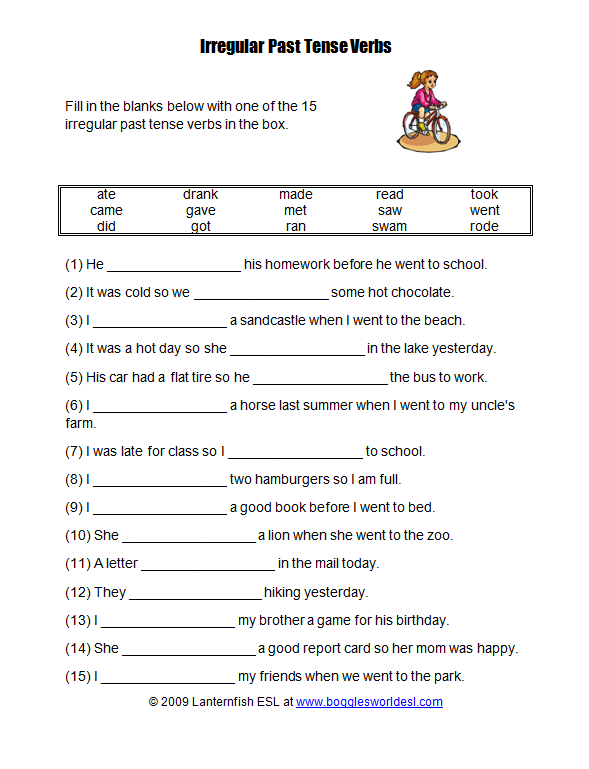 The worksheets include:
The worksheets include:- Free fun worksheets, flashcards, gap-fill song worksheets, pdf phonics worksheets, classroom game ideas, jeopardy powerpoint, and grammar rules, including complimentary posters
- Interactive video grammar games, multiple choice vocabulary games, which include the following: action verb games, conditional games, future tense games, genre games for literacy and editable board games for classroom and home schooling
- Young learner alphabet quiz, anatomy questions to practice body parts, ordinal number and months testing for festivals and months of the year games, cuisine interrogatives for food and drink games, jobs and places of work self-grading quizzes, planets and space interactive games, and time expressions for kids.
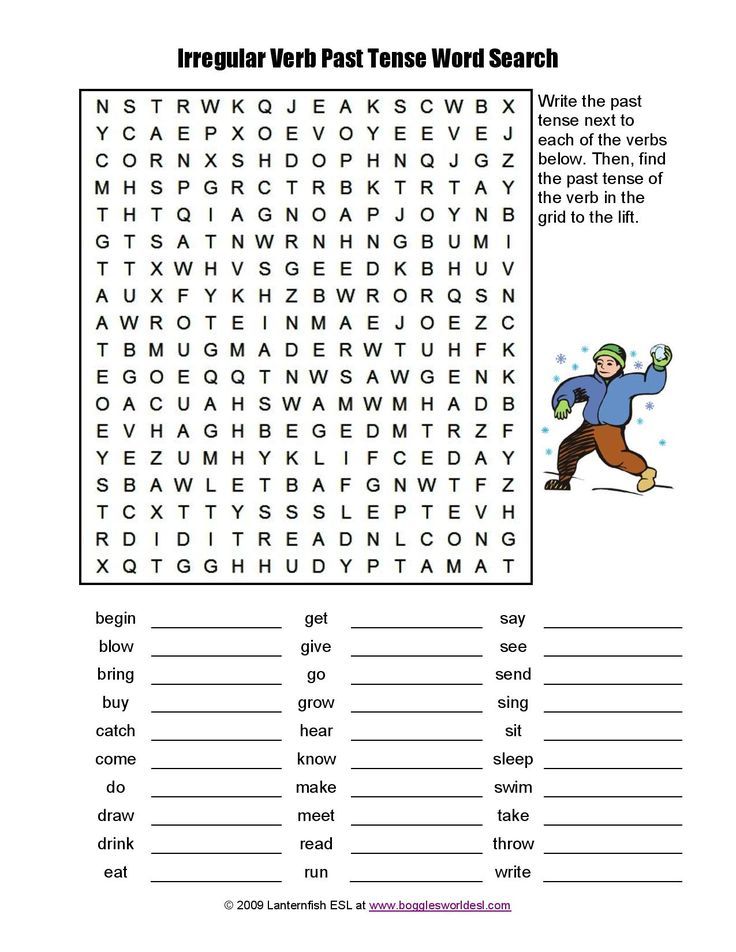
- An array of word search puzzles, A-Z word scrambles, communicative role play activities, adjectives worksheets, and past tense exercises
- Printable PDF worksheets covering accidents and disasters communicative surveys, advice matching printables, animal writing and drawing worksheets, birthday and party pages, the body and anatomy, camping vocabulary word searches, household chores sentence scrambles, and Christmas questionnaire worksheets for festive fun.
- Lower and upper-intermediate song activities for auditory practice, vivid grammar definitions and infographics, and classroom TPR activities
More Worksheets
ESL Materials and Activities
Classroom Games
Classroom game ideas and activities for learning and practising English.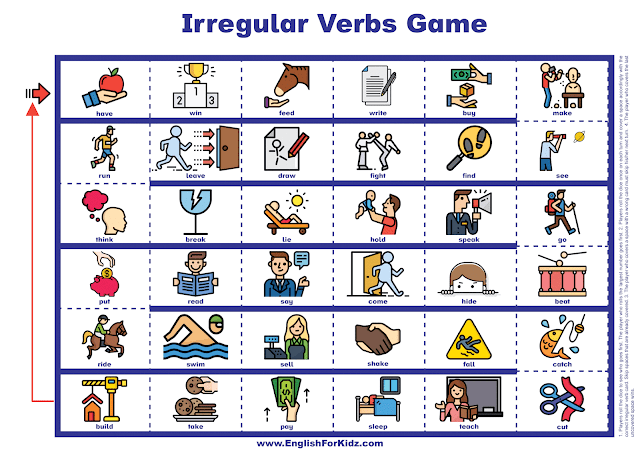 We have practical ideas to make your teaching more fun.
We have practical ideas to make your teaching more fun.
Kids Activities
These include video stories, worksheets, powerpoint, handwriting pages, colouring printables, flashcards, and Jeopardy quizzes for classroom use.
Phonics Ebooks
by ESL Kids World
Puzzle Ebooks
by ESL Kids World
Grammar Ebooks
by ESL Kids World
Free Resources for Kids
ESL Phonics World
ESL Phonics World - 100's of phonics games for preschool and kindergarten kids. Free interactive online phonics games to help teach children the relationship between letters and sounds and develop the skills needed to read and write. All our worksheets, songs, and craft resources are designed by an experienced team of teachers.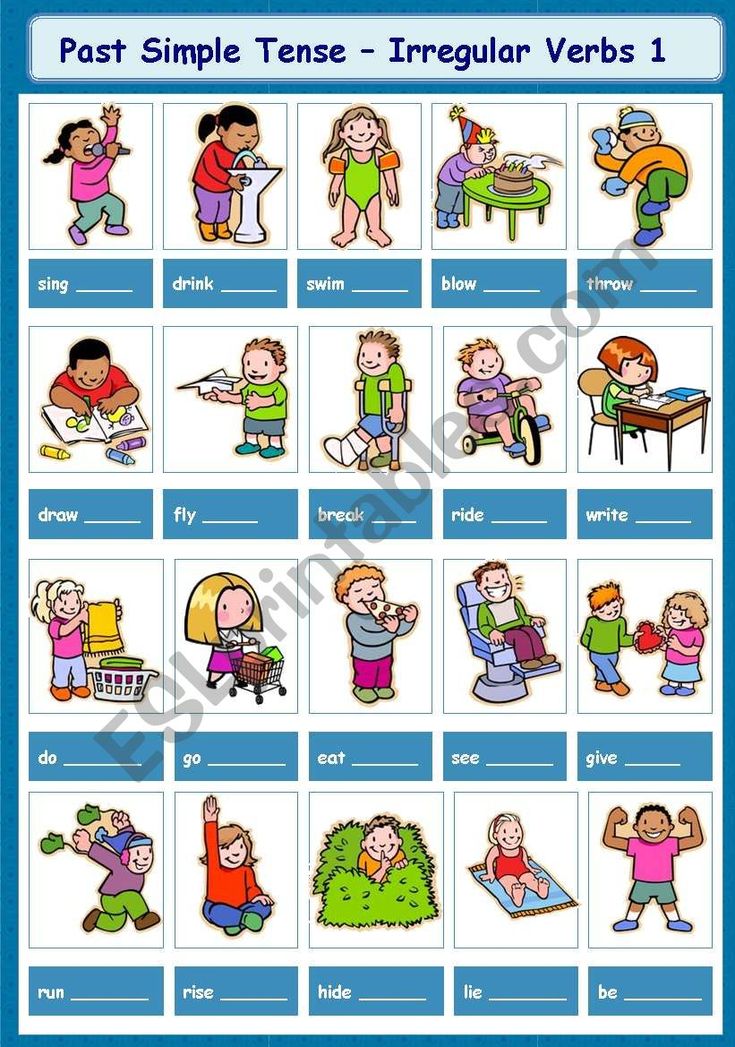
ESL Puzzles
ESL Puzzles - Enjoy a wide range of fun EFL grammar and vocabulary games. Word search pages that are perfect for kids learning English, as well as teachers looking for free educational resources online. EFL activities for kids include: ESL games, free editable templates and powerpoint printables for preschool and primary English learners.
Kids ESL Games
Kids ESL Games - A selection of quizzes for EFL and TEFL practice. Aimed at ESL students, our phonics and spelling worksheets benefit young children's reading. Take the burden off lesson planning and play board games, or vocabulary games. A collection of card games and English exercises, ideal for beginner and pre-intermediate learners.
Grammar and Vocabulary Exercises
Grammar Games
Play 100's of free grammar quizzes and practice your English grammar.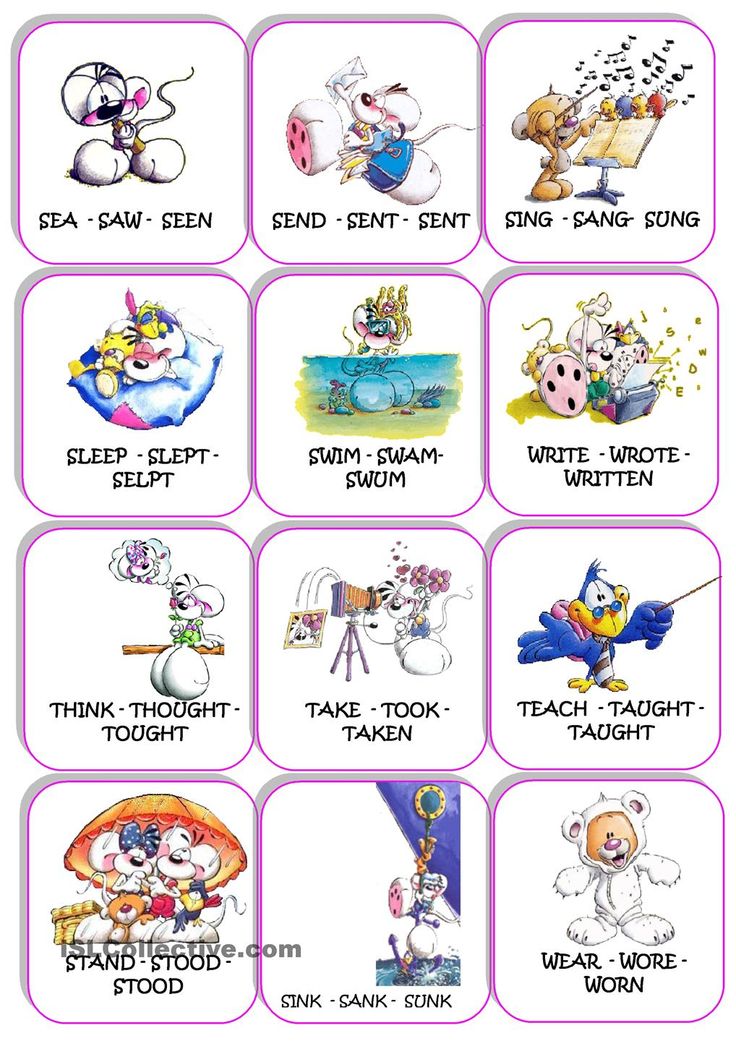
Vocabulary Games
Multiple choice vocabulary games for ESL young learners and kids.
Worksheets
Worksheets arranged in sets and categories to arm teachers with free printables.
ESL Store
Downloadable ESL products: High quality ebook packs for pre-k and primary children.
- learning esl, teaching esl, teaching materials, kids, worksheets, printable worksheets, kids worksheets, interactive games, esl games for kids, esl activities, games, powerpoint games, interactive quizzes, exercises for esl young learners, classroom games, esl flashcards, esl worksheets, english grammar exercises, young learners, printables, children, flashcards, pdf worksheets, phonics printables
See Our 8 Top Tricks That Make Irregular English Verbs Easier to Learn
By Yuliya Geikhman Last updated:
Just when you finally think you understand English grammar and all the different tenses, you discover irregular verbs.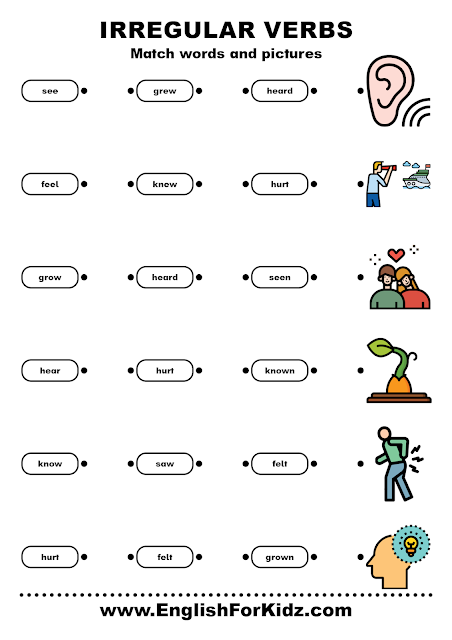
Most words in the English language follow the rules: today I use, yesterday I used.
Irregular verbs are a challenge because there isn’t one rule you can learn for them. They don’t follow the pattern. You just have to memorize them.
But don’t worry! This guide will help you learn to recognize English irregular verbs wherever you see them.
Contents
- How to Recognize an Irregular English Verb
- How Common Are Irregular English Verbs?
- The 8 Top Tricks for Remembering Irregular English Verbs
- 1. Group common irregular verbs together
- 2. Learn all new vocabulary with its tense forms
- 3. Memorize the 10 most common irregular verbs first
- 4. Turn memorizing into a game
- 5. Learn in sentences
- 6. Learn with songs
- 7. Leave lists where you can see them
- 8. Ask people to correct you
Download: This blog post is available as a convenient and portable PDF that you can take anywhere.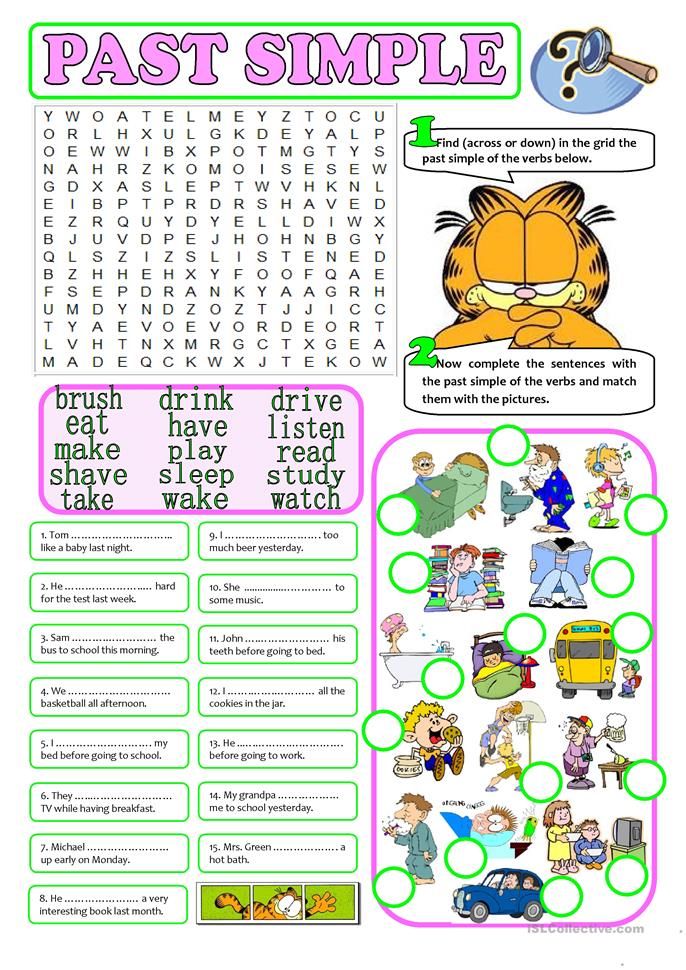 Click here to get a copy. (Download)
Click here to get a copy. (Download)
How to Recognize an Irregular English Verb
Knowing the history of irregular verbs is interesting, but it doesn’t help you learn them. To study irregular verbs, first you should understand what irregular verbs are.
Regular verbs always follow the same pattern. They look the same in the past and are easy to form. Usually all you have to do is add the letters -ed at the end of the word!
Here are some examples:
I work, I worked, I had worked.
He laughs, he laughed, he had laughed.
Irregular verbs, though, don’t follow that pattern. You can recognize them because they look so different in the past tense.
Some examples:
I write, I wrote, I had written.
He builds, he built, he had built.
An English verb is irregular when it doesn’t end in -ed in the simple past tense and past participle form.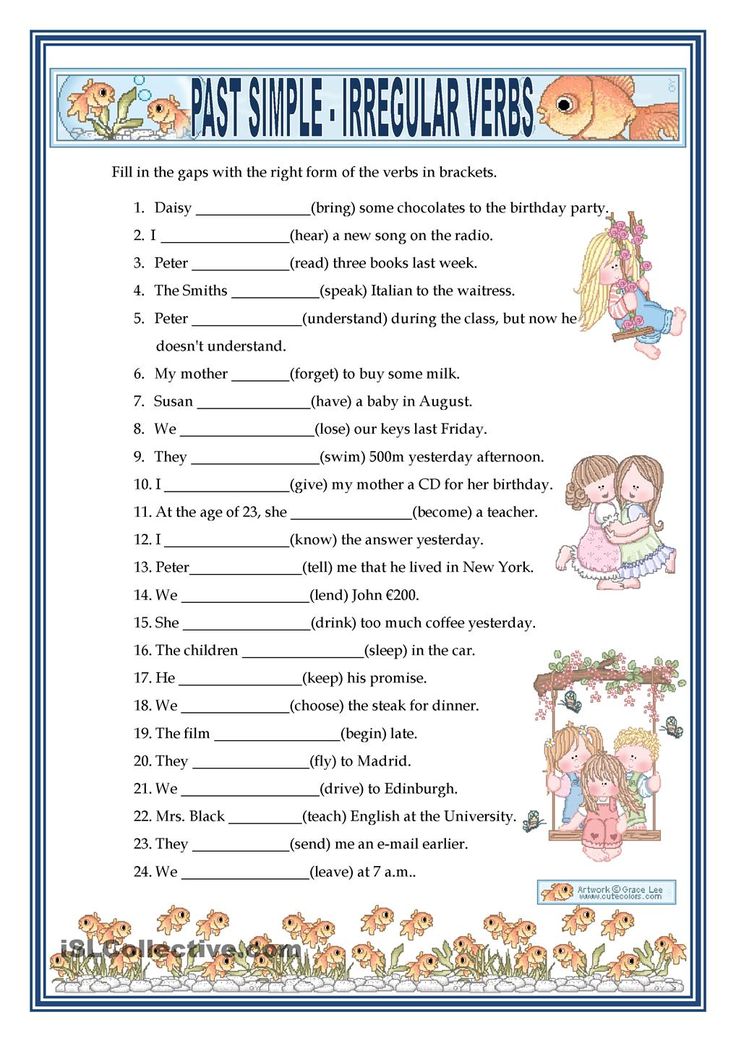 Not sure what those are? Here’s a simple way of looking at it:
Not sure what those are? Here’s a simple way of looking at it:
- The simple past tense describes any action that takes place before right now.
- Regular verb: I worked for 40 hours last week.
- Irregular verb: I spoke to my best friend yesterday.
- The past participle is used in other English tenses that have an auxiliary (or “helping”) verb. For example, the past perfect tense uses the auxiliary verb “have” + the past participle of your main verb to describe an action that happened and ended in the past.
- Regular verb: I had worked for the company for only 6 months when I decided to leave.
- Irregular verb: I had spoken at over 50 schools by the time I turned 30.
If you want to see all this in action, check out FluentU. With FluentU, you’ll never miss an irregular verb again.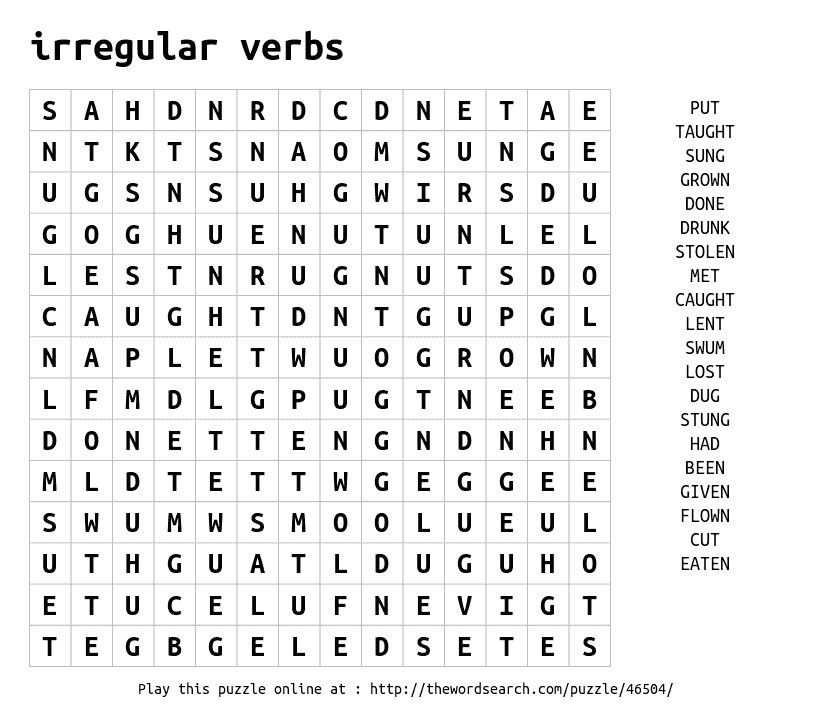
How Common Are Irregular English Verbs?
Many of the most common verbs are irregular, so learning them is important!
Some words that you use every day in conversations are irregular. You may need to tell someone that you’ve already begun working on the new project at work. Or you might want to tell a friend: “I saw you in the park yesterday, but I didn’t say anything because I thought you were busy.” See how both the words saw (past tense of see) and thought (past tense of think) are irregular?
The list of irregular verbs is not a very long one, when you consider that there are over a million words in the English language! It can still be tough to learn them, if you don’t know where to start.
The first thing to do is to just look at a list. You can find a list of irregular verbs in the English language right here.
And now, to learn them! Luckily, there are some tips you can use to make learning irregular verbs easier.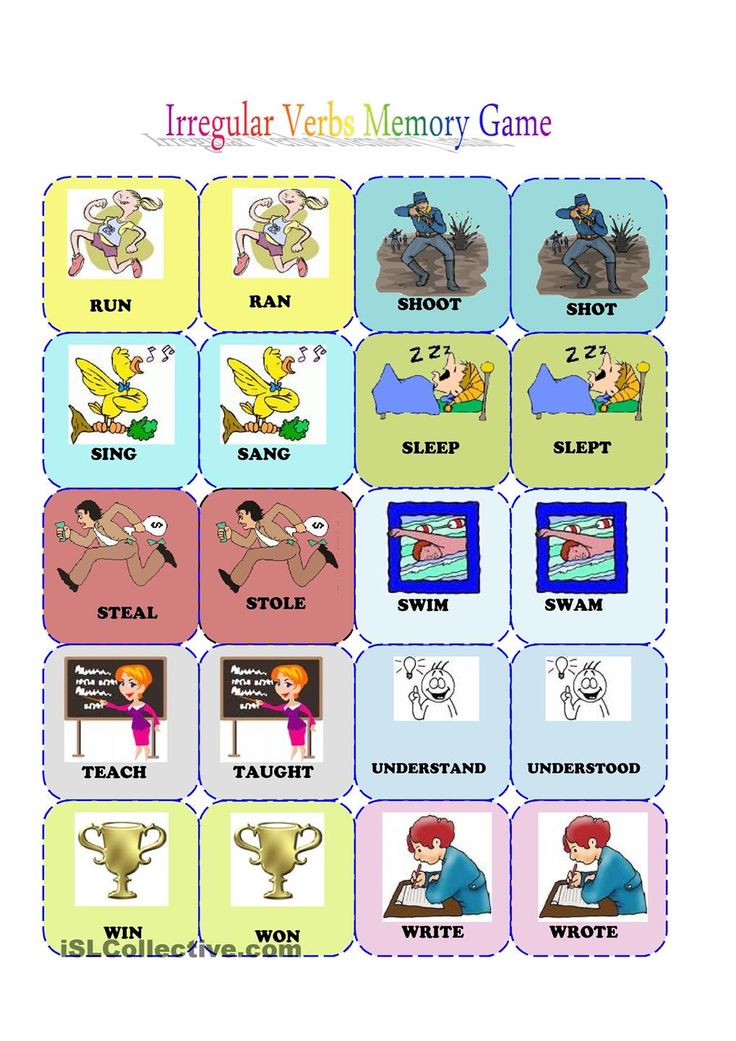
The 8 Top Tricks for Remembering Irregular English Verbs
1. Group common irregular verbs together
Irregular verbs don’t follow any rules, which is what makes them so hard to remember. But some irregular verbs follow a similar pattern. Instead of learning the verbs in alphabetical order, try putting them in similar groups.
How you group the verbs depends on whatever is easiest for you, but here are a few suggestions:
- Verbs that remain the same in the present, past and past participle.
- Examples: cost and set.
- Verbs that are the same in the past forms, but not the present.
- Examples: breed, bred and shoot, shot.
- Verbs that end in -en in the past participle.
- Examples: speak, spoken and wake, woken.
Look through the list of irregular verbs and find patterns of your own!
2. Learn all new vocabulary with its tense forms
You can make irregular verbs easier for yourself in the future by just learning them right from the beginning.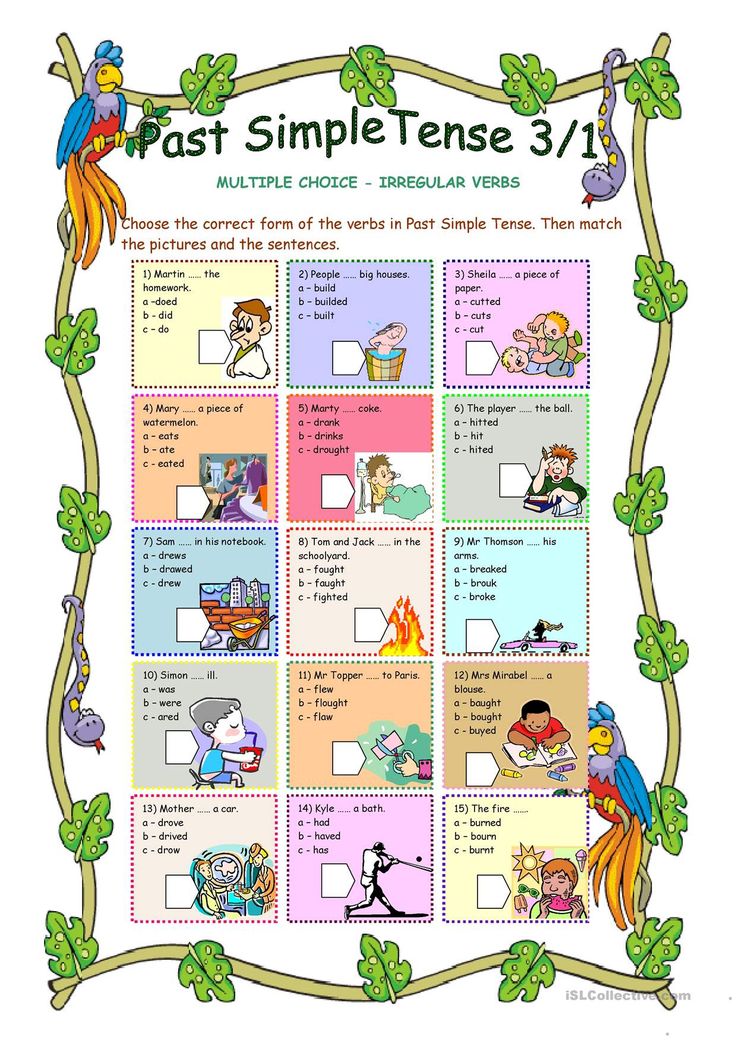 Every time you learn a new verb, learn its tenses as well.
Every time you learn a new verb, learn its tenses as well.
Don’t just learn that to steal means to take something without permission. You should also learn that its simple past tense is stole and its past participle is stolen.
3. Memorize the 10 most common irregular verbs first
Not all irregular verbs are commonly used. You might never use a word like broadcast, and you’ll probably only see the word abide as part of the phrase law-abiding citizen (that’s someone who follows the law).
Instead of going through the list in alphabetical order, focus on the most commonly used words first.
Start with these very common words (they’re listed as present, past, past participle):
- Say, said, said
- Go, went, gone
- Come, came, come
- Know, knew, known
- Get, got, gotten
- Give, gave, given
- Become, became, become
- Find, found, found
- Think, thought, thought
- See, saw, seen
That’s right, all these tiny but very important verbs are irregular! You’ll need to know their irregular forms to use them in everyday conversation.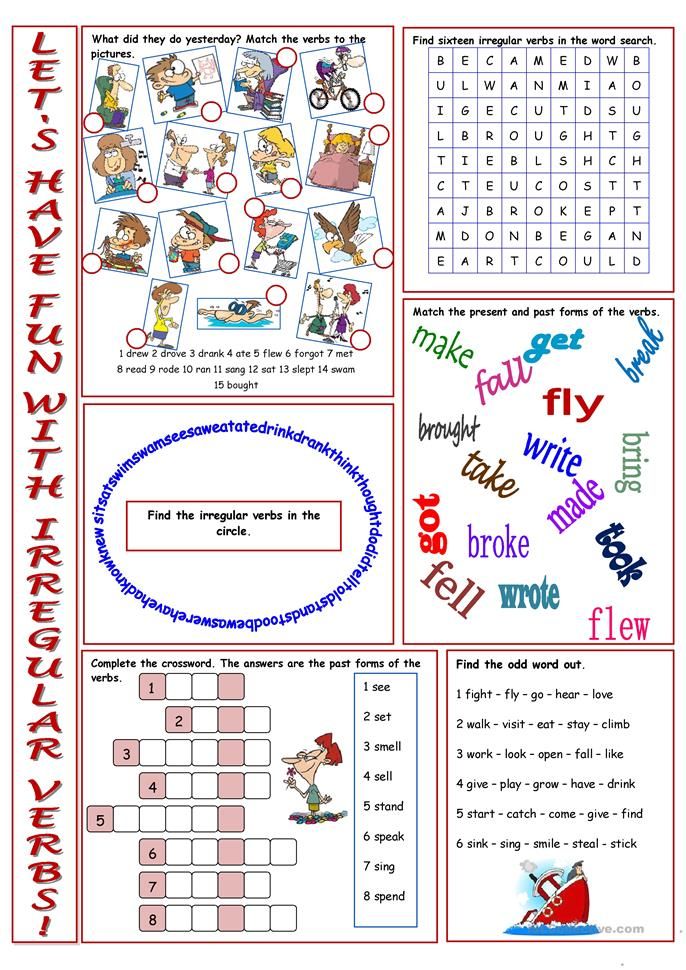
4. Turn memorizing into a game
You might have no problem remembering the irregular verbs using flashcards, but if you’re having trouble why not turn it into a game?
There are a few games online that can make remembering the verbs fun and easy. The British Council has a quiz-like game, the MacMillan Dictionary has a verb wheel, and Quia has a game similar to Jeopardy.
You can even make your own game with index cards: write the verb and their past or past participle (or both) on separate index cards. Then turn all the cards over in front of you with their backs up.
Now you can play a memory game. Turn a card over, then another. If the two cards match, leave them face up. If they don’t, turn them back over and try again.
5. Learn in sentences
It might be easier to remember the words when they’re part of a sentence of a phrase. Learn words by putting them into sentences, and you’ll also be learning how to use them correctly.
To learn the word see, for example, you can use sentences like this: “I see the bee, I saw the snow, but I’ve never seen a bee in the snow!”
Be creative—the weirder the sentences are, the easier they will be to remember.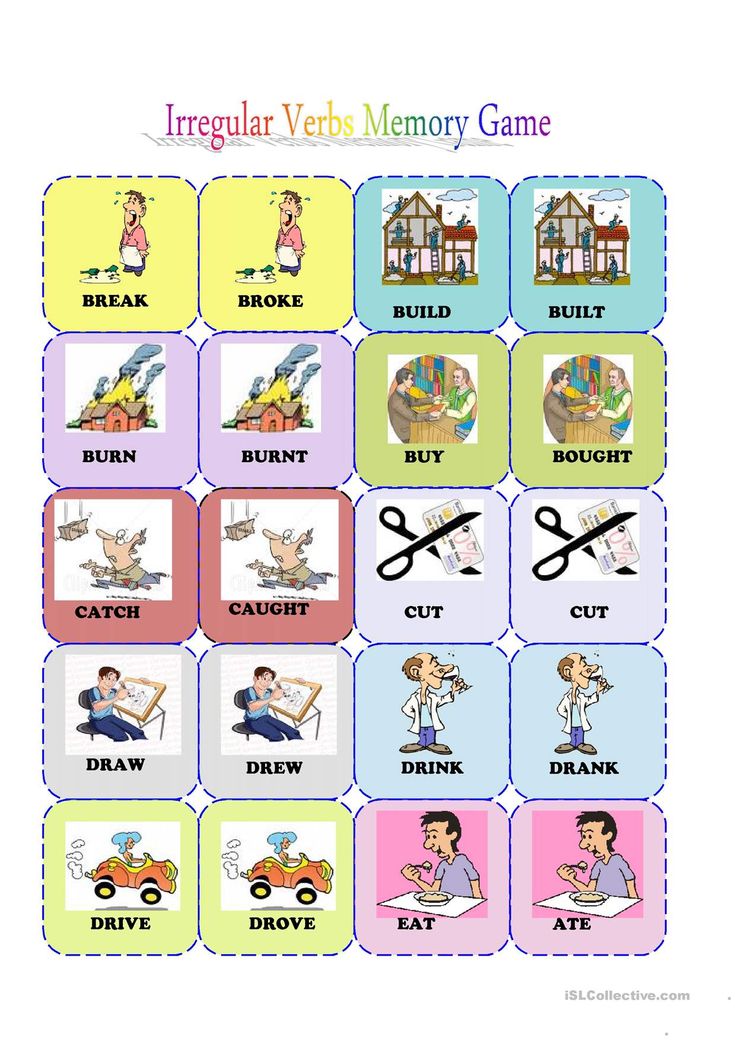 You can use rhymes, keep the sentences short or create an entire story using as many verbs as you can. How you do it is up to you, as long as it helps you remember the verb forms.
You can use rhymes, keep the sentences short or create an entire story using as many verbs as you can. How you do it is up to you, as long as it helps you remember the verb forms.
6. Learn with songs
Another great way to give the words more meaning is through using music. You can find many songs for remembering irregular verbs on YouTube. Here are three of the best:
- FluencyMC uses a catchy rap song to teach the forms of some of the most common irregular verbs.
- This adorable cat video tells a story while teaching the verbs.
- Schoolhouse Rock is a classic cartoon with fantastic music you’ll be singing for days after you hear it.
Music videos (and videos in general) are helpful for learning these verbs, because you hear and see each word in context. If you enjoy learning English words from videos and music, then you can search for music videos online on places like YouTube and make your own study playlist.
There is also the language learning program FluentU.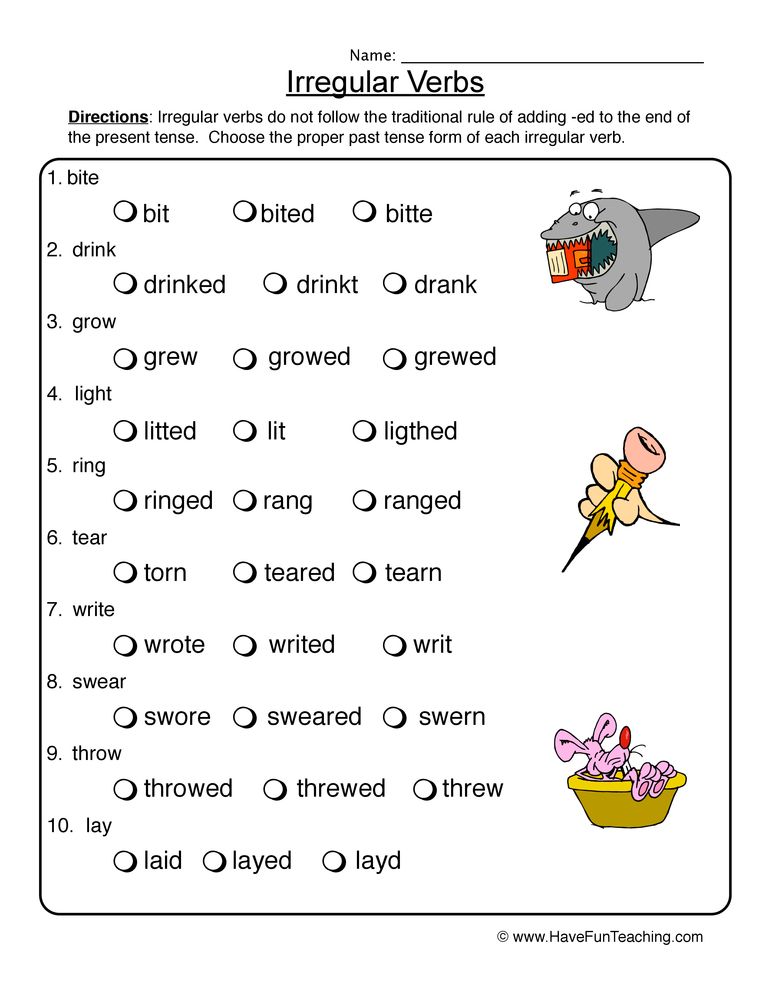 It teaches English with authentic media like music videos and news clips.
It teaches English with authentic media like music videos and news clips.
The videos on FluentU are sorted by topic and difficulty. They all have interactive subtitles that let you look up words as you watch and provide both translations and example sentences. This helps you get comfortable with irregular English verbs because you’ll see how they are used in native English speech and in a variety of situations.
7. Leave lists where you can see them
Sometimes just memorizing is the best way to go. To make this easier for you, divide up the verbs in groups of 5 to 10 words (you can group them alphabetically, by how common they are or by the groups we suggested earlier in this article).
Write the verbs out on paper, and leave them in spots where you can see them throughout the day. Tape the list up behind your coffee maker, on your table, even on the bathroom wall! Looking at the list just a few minutes a day can be enough to remember them.
Once you feel that you’ve remembered the full list, move on to the next group of verbs.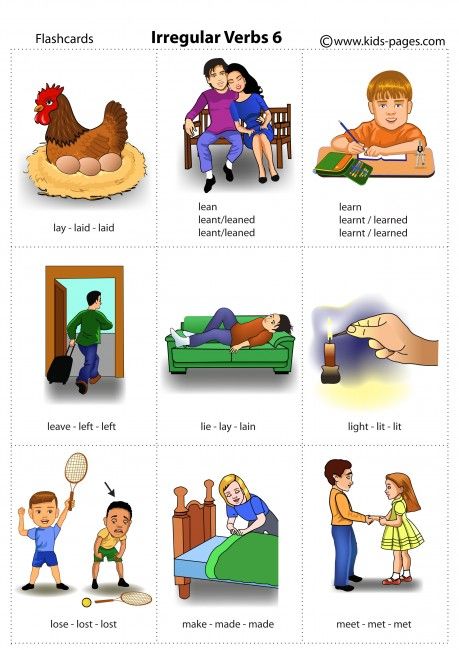
8. Ask people to correct you
Nothing beats practicing—but practicing correctly is important too! Whenever you’re speaking to an English speaker, ask them to correct you if you make a mistake when you speak. This is great not just for irregular verbs, but for any of your English speaking.
Make sure you can accept their correction without getting upset or discouraged. Remember, they’re helping you!
After reading all these tips, that list of irregular verbs doesn’t look so scary anymore, does it?
Download: This blog post is available as a convenient and portable PDF that you can take anywhere. Click here to get a copy. (Download)
« Learning with the Stars: 18 Advanced English Vocabulary Words from Famous Songs
30 Essential Fast Food Vocabulary Words for Eating and Learning on the Go »
How to help children learn irregular verbs? 7 tasks
“How can I learn so many irregular verbs by heart? When to use went and when gone?” asks the student.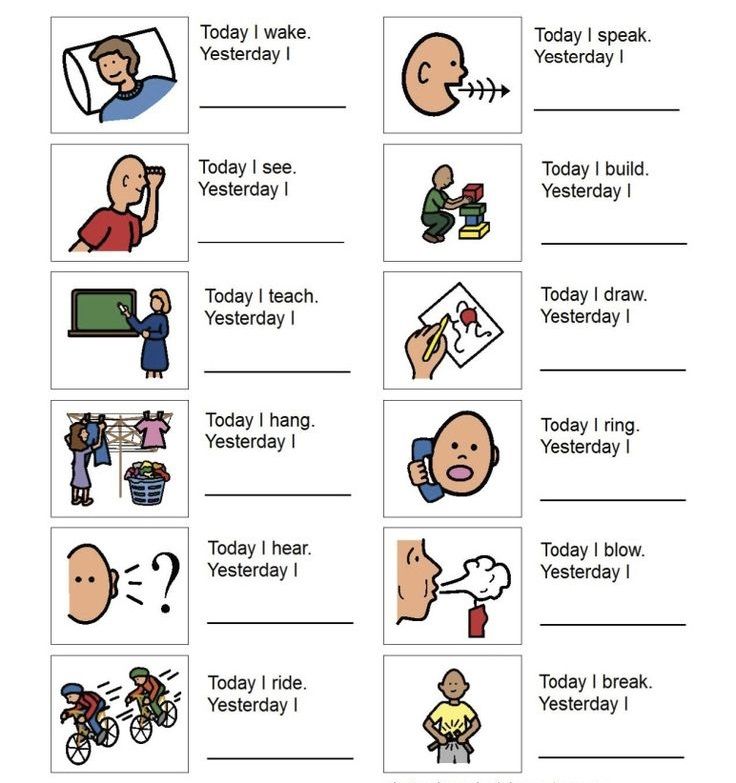 Familiar situation? Use this compilation of irregular verbs exercises to keep younger students from getting bored in English class.
Familiar situation? Use this compilation of irregular verbs exercises to keep younger students from getting bored in English class.
1. Grammar songs
Grammar songs help students remember structures in context. Look at the example:
Step 1. Play the video and ask the students to listen to the song and sing along.
Step 2. Watch the video again and offer to write down the subjects with the predicates.
Step 3. Turn down the volume and have the students sing it from their notes.
Step 4. Ask questions. If possible, hum like in a song - it will be more fun and natural:
- What did the character do yesterday?
- Where did he go?
- What did he wear? nine0025
Step 5.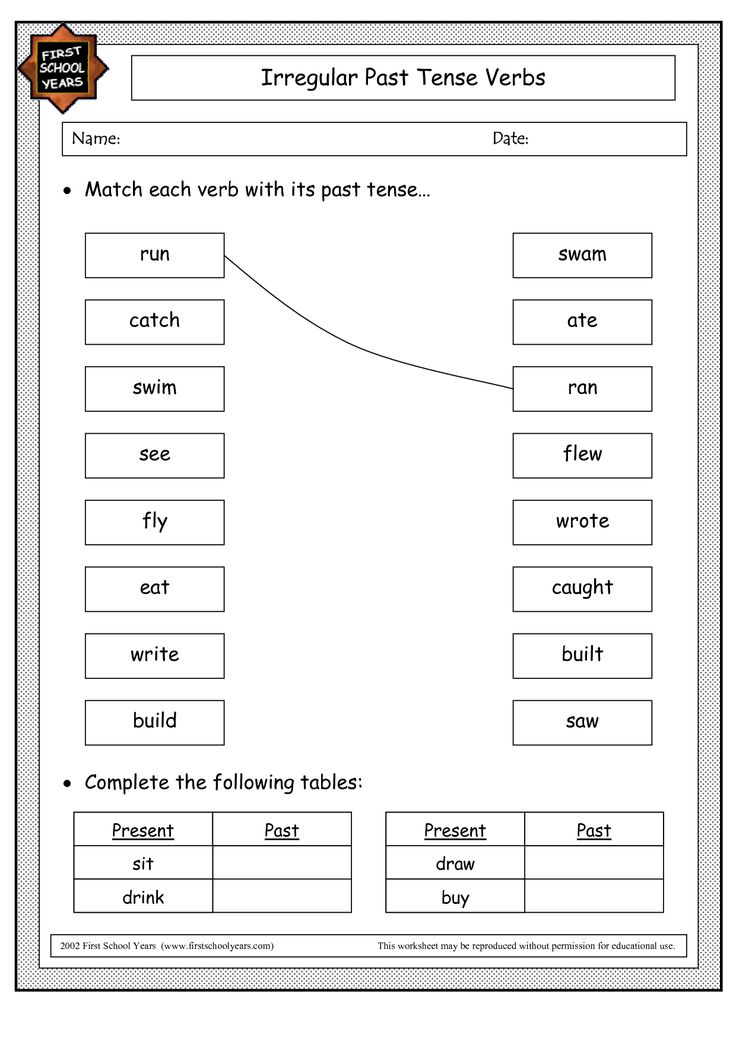 Follow-up discussion ( follow-up discussion ):
Follow-up discussion ( follow-up discussion ):
- What did you do yesterday?
- Where did you go on Monday?
- What did you wear last Sunday?
Here are a few more songs that I often use with students:
2. Tic-tac-toe
Draw a table on the board, as for playing tic-tac-toe, write the verbs in the initial form into it. Divide students into two teams. The children must take turns writing a cross or a zero and put the verbs in the cells in the past tense. nine0003
Interesting topic: How to use noughts and crosses in ESL classes
3. Relay
Step 1 . Write on the board two columns of basic verbs that the students have already learned.
Step 2. Divide the class into two teams.
Step 3. Have the students stand in a line facing the board.
Step 4. The first student from each team has to run up to the board and write the past form of any verb next to the main form.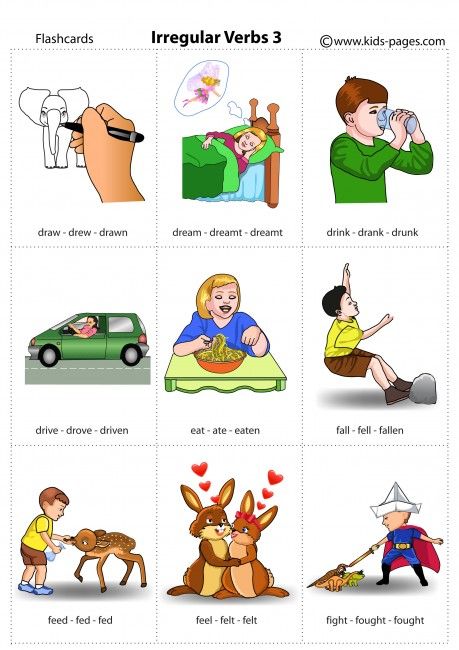 nine0013 Step 5. This student then runs back and passes the token to the next student in line. Continue until one team has written all the verbs in their column.
nine0013 Step 5. This student then runs back and passes the token to the next student in line. Continue until one team has written all the verbs in their column.
4. Hot Potato
Have a ball or soft toy ready and play some fun music. The teacher calls one irregular verb, the students pass the object. When the music or the timer stops, the person holding the object must form a sentence with the irregular verb in the past tense. nine0003
This game will help students not only practice irregular verbs, but also work on speaking.
5. Memory circle
This activity will help children improve their memory, practice listening and speaking skills, and memorize irregular verbs.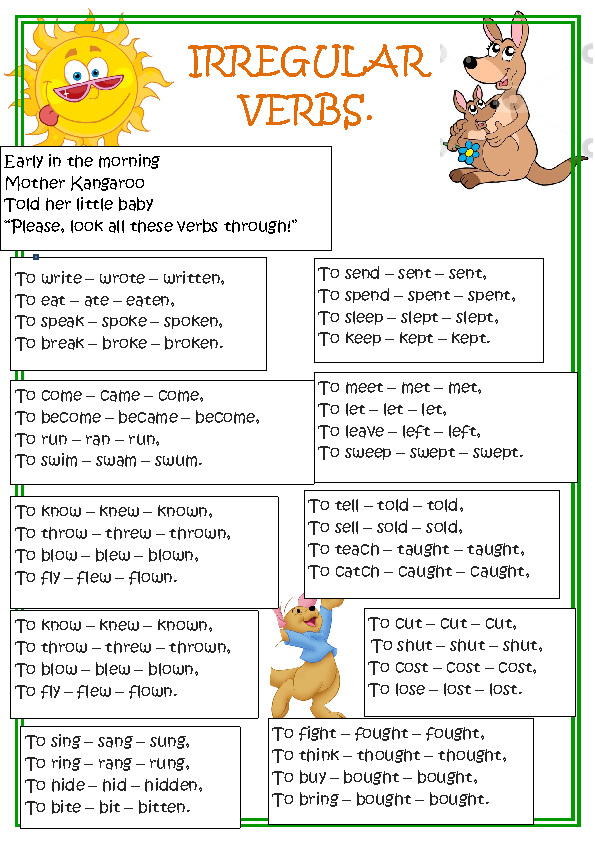
The teacher gives a list of irregular verbs that students should use in sentences. The first student makes up a sentence using one of these words. Then the following students repeat it and add their own. nine0003
For example:
- I swam in the lake yesterday.
- Tom swam in the lake yesterday and I ate pizza yesterday.
Write the verbs in the boxes arranged in a chain: from start to finish. Pupils roll a die and name the past form of the verbs. The first student to reach the finish line will be the winner.
Games for an online lesson:
Interesting topics:
Overview of board games for learning English
5 board games for improving vocabulary
Boards: Playing and practicing fluency in English
In this online grammar game, kids use their knowledge of irregular verbs to match each present tense word with its past tense counterpart.
Cut the word cards in half for matching. Use them as pictures in lotto, dominoes and couples games.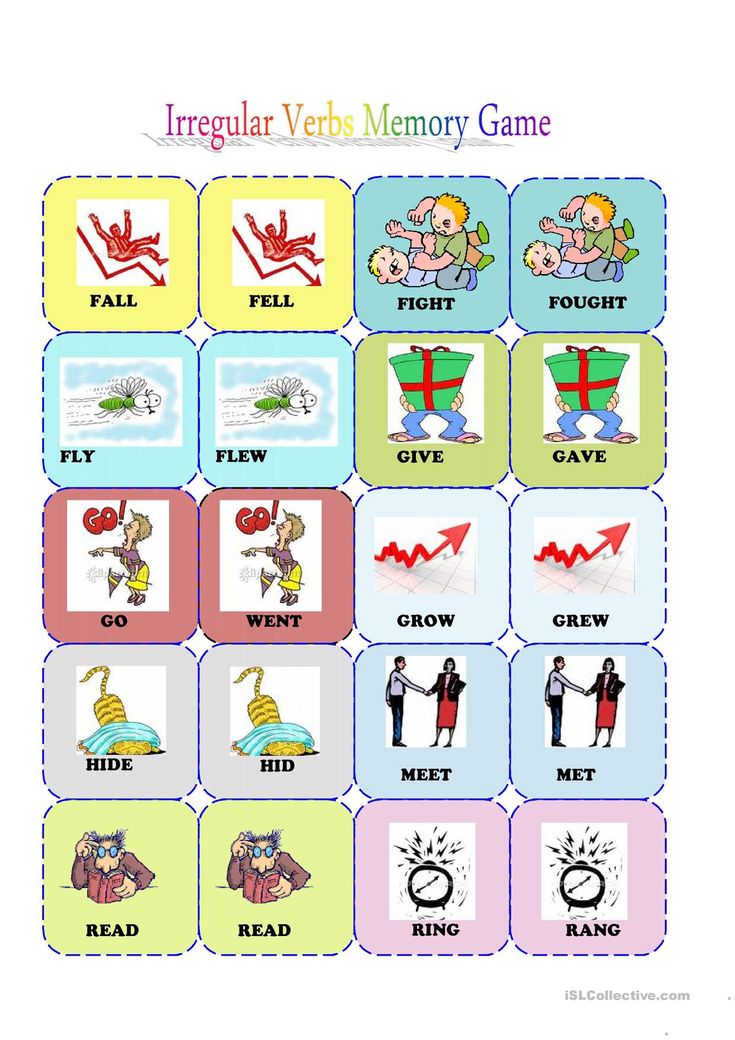 Make up funny stories with them and pull them out of the hat - funny games will help you remember irregular verbs and talk about the past in English. nine0003
Make up funny stories with them and pull them out of the hat - funny games will help you remember irregular verbs and talk about the past in English. nine0003
Interesting topics: Irregular verb exercises
Are there windows in the schedule? Let us help you complete them! The most convenient way to increase your income without wasting extra time: we will provide materials, support for methodologists and students. Click on the link for details: Skyeng
English Irregular Verbs in Groups with Tables
About Languages
Grammar life hacks Expertise
Interesting
Vocabulary About VKS-IH Language SMAK
Grammar 08/14/2019
Irregular verbs are the very topic that will terrify any English learner. How to remember them? What about exceptions? Why do some verbs change form, and some - at least something? Who's guilty? What to do? nine0003
How to remember them? What about exceptions? Why do some verbs change form, and some - at least something? Who's guilty? What to do? nine0003
The most used verbs are just irregular verbs, because due to frequent use they have undergone the biggest changes.
They are very popular, which means they are most often subject to change. Hence the incorrectness. Hence the complexity.
Ordinary verbs, in order to convert them to the past tense and Past Participle, just need the ending -ed . With some, such a simple scheme will not work, and they are called wrong. nine0013 They will be discussed.
Where and how often do we use irregular verbs?
Most often, for our convenience, they are depicted in the form of three columns - Infinitive; past tense; past particle; The second column is used quite often, about every time we talk about the past tense. If we are talking about perfect tenses and the passive voice, the third column comes into play. We designated it Present Perfect, because the study of the third column begins from this time.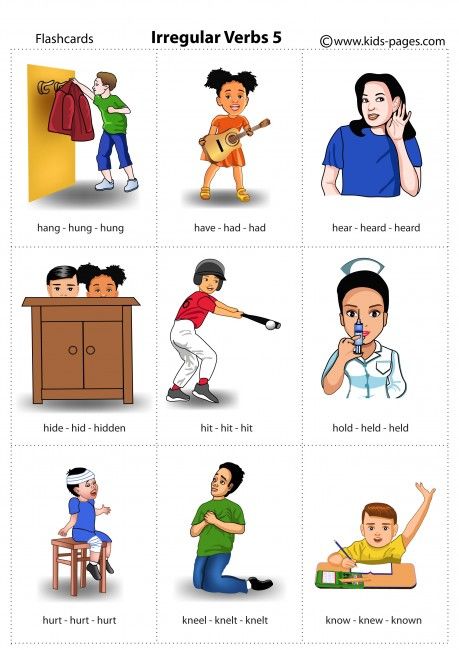 nine0003
nine0003
All forms of irregular verbs are equally important in English, but for the initial knowledge of the language, you first need to curb column number two. And it’s better not to highlight anything and learn all three columns at once.
In this article, we will highlight the most important tricks and techniques for learning and understanding irregular verbs together with Maria Molashenko, senior lecturer at VKS-IH. To begin with, irregular verbs are easier to learn in groups. So, to begin with, we will highlight for you the most popular groups for which verbs are easier to learn and remember. If you learn all the irregular verbs in a row, then it is more difficult to remember them, because there is little logic. And if we start learning irregular verbs in groups, then you will find logic in them and the memorization process will be greatly simplified. nine0003
Irregular verb groups
Do not make the main mistake of a beginner - do not start learning irregular verbs in a row without breaking into groups, and without revealing at least the slightest logic.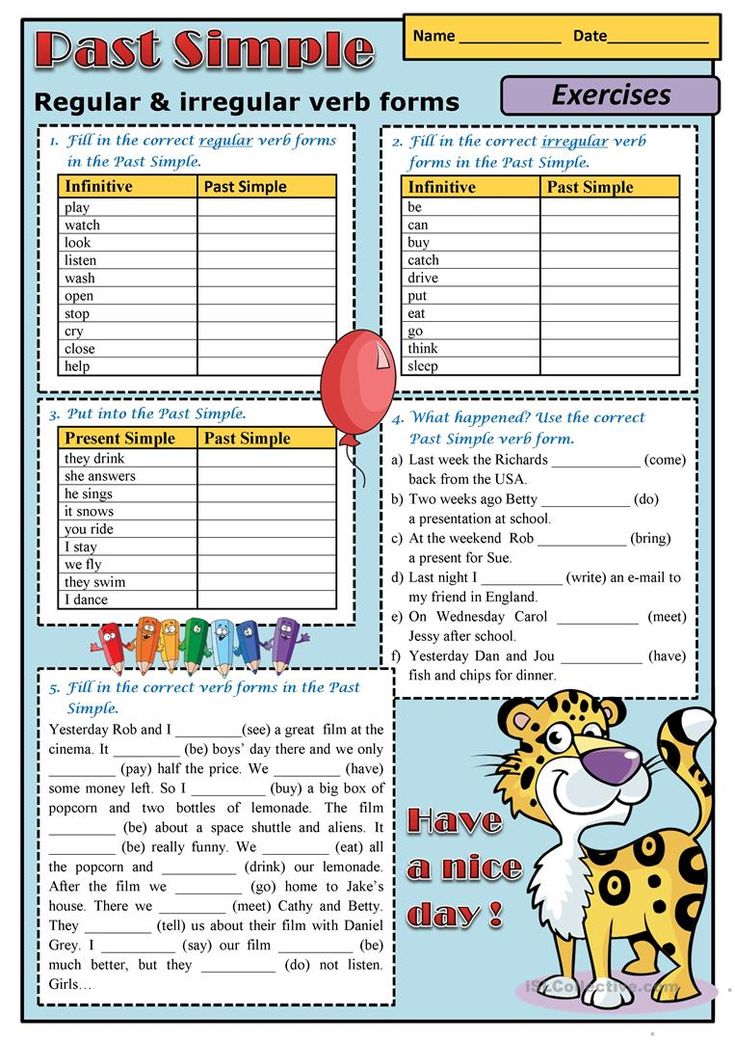 It is a trap!
It is a trap!
The first group - all three forms are the same.
The first group is the simplest - all three forms are the same, so you don’t even need to learn them, which is great news.
The spelling and sound of all three forms are exactly the same! nine0003
The second group - the second and third forms are the same.
The next few groups also have the same second and third forms, which greatly simplifies the task of memorizing irregular verbs.
And these groups also have logic.
Note the following table, where the second and third columns are changed to [ot].
Remember that all words ending in ought and aught are always pronounced with [ot]. nine0132
The third group - the forms of the verbs do not match.
And the most difficult group, in which all the verbs do not match and are written and pronounced differently.
But despite this, they also need to be understood, accepted and learned!
How to learn irregular verbs correctly?
So, so what? How is everything to be learned in the end?
Catch advice from our senior teacher Maria Molashenko.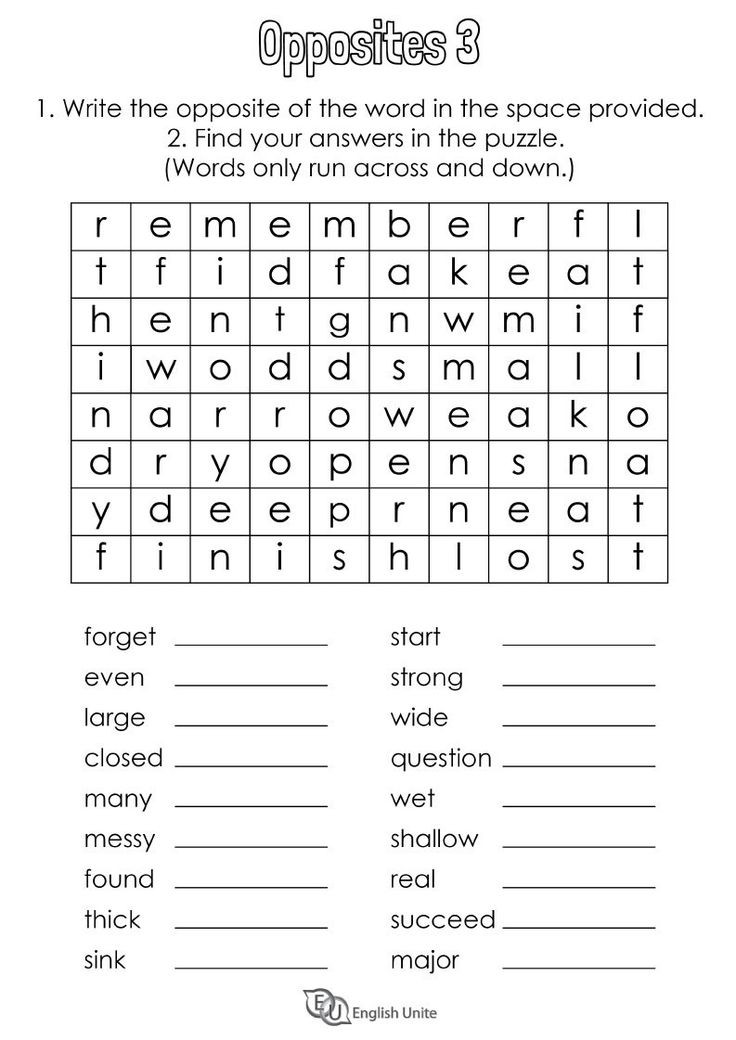
- Maria's super tip: learn verbs not as a whole line, but by "pulling out" one word from the three. So you do not have to pronounce all three forms one after another to remember the right one. Maria has prepared super-lists for you, which you can get just by filling out the form at the end of the article. nine0025
- Make sentences silently with the verbs you need and need to use in life. Verbs are remembered better in context, especially if it is related to you.
- Pay attention to the forms of irregular verbs in movies and songs. After all, when you are interested, everything is easier to remember! Watch your favorite movies, listen to your favorite songs and immediately pay attention to irregular verbs, pronounce them and memorize them! nine0024 Read in English. It doesn't have to be something that weighs like War and Peace. Articles, comments, posts in social networks. Why not combine business with pleasure?
There are many irregular verbs, and they all seem scary, complex, completely wild and illogical.